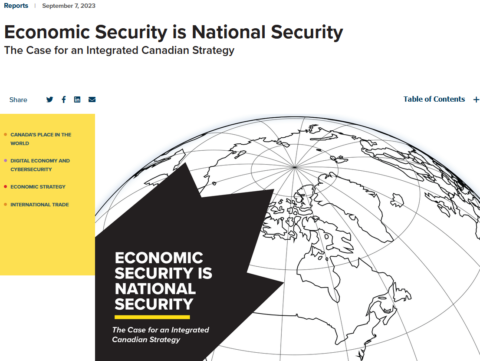In The Line, Matt Gurney praises both the delivery and the content of a recent report by the Business Council of Canada urging Canadian governments to pay a lot more attention to economic security issues that seem to be almost universally neglected in favour of mediagenic gestures and battlespace prep for the next election.

Business Council of Canada report – https://thebusinesscouncil.ca/report/economic-security-is-national-security/
But as I was reading the report, there was this nagging thought in the back of my mind. Why is the Business Council of Canada trying to impress upon the government (and the country at large) the importance of economic security? Why do we need a report from top business leaders to remind our political leadership that poor countries aren’t generally safe and peaceful ones, and that there are countries out there that would wish us harm and that we need to be on guard against? Like, shouldn’t we know that already? Because none of this stuff is revolutionary. It’s all extremely basic stuff that any mature country should just sort of intuitively grasp. Right?
And that’s when the shoulder-slumping realization lands on you like a ton of bricks. We should, but in this country, we don’t. We just don’t. Because, well ….
Uh oh.
It seems to me that a country shouldn’t need a report to impress upon key civilian leadership that economic prosperity is the cornerstone of all security, or that, on the flip side, security is a prerequisite for prosperity. Toronto is a fair bit rougher than it used to be these days — join us at our event next month! — but when I leave the house to run an errand, I’m reasonably confident I’m not going to be abducted by a band of roving pirates prowling the leafy streets of Leaside. When I head up north for the weekend, it doesn’t occur to me that there’ll be a checkpoint along the route, looking to shake me down or carry off my children into slavery. In the mornings, when I lurch out of bed with a groan that gets louder with each passing year, I expect that the light switch will indeed result in light and that the faucet in the bathroom will provide clean water. I don’t have to worry about whether the water treatment plant has been bombed or the power lines shelled.
Many of my Canadian readers may find the above absurd or, at least, a bit of hyperbole. But that’s the point. As I have written many times before, almost everything we do in this country, and almost our entire self-identity as Canadians, accepts internal security and safety from military attack as an ironclad given, just by default. That makes sense: that has been the norm for us, for a long time. It seems absurd precisely because how distant it seems from our normal.
But it isn’t the norm in any historical sense much beyond a human lifetime or two or three, even in Canada. And more to the point, as the voice-over guys in the commercials say, past performance may not be indicative of future results.
We are not owed prosperity in perpetuity. We are not guaranteed security by virtue of our niceness. These are precious things that require more than just good luck — and good luck, thank God, is something Canada still does seem to have. In addition to luck, though, we need realistic understandings of our strengths, weaknesses and the threats we face. We need political leadership that is mature and aware enough to understand the difference between political interest and national interest, and that is seized enough with these issues to devote the necessary resources to building up and preserving our security, from all reasonably foreseeable threats. That includes not just investments of money and people, but also simply intellectual bandwidth and emotional toil. We have to think, hard, about things that aren’t nice to think about, and have robust, effective institutions and a critical mass of people with the necessary combination of mindset, academic and professional training and lived experience to be effective at foreseeing, heading off and, when necessary, managing crises that threaten our safety and prosperity. We need a supportive bureaucracy that is efficient and task-focused and doesn’t get in the way of all this vital work.
Does any of this sound like Canada to you?!
Does it sound like the leader of any of our governments, or any of the people who’ll replace those leaders? Does it sound like any of our institutions except the ones specifically tasked with security and defence? You know, the ones we habitually starve so we can spend a few extra bucks and a bit more political capital on something a bit more pleasing to the average voter? Does it sound like the sort of thing smart, well-read and educated Canadians spare a single solitary moment thinking about as they go about their day to day lives?
Of course not. No one does, and our politics reflect this. These just aren’t issues of concern in Canada outside of the military, the intelligence agencies and a few fellow journalists and academics I could probably recount here in their totality by their first names.







